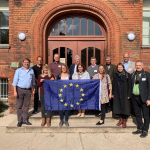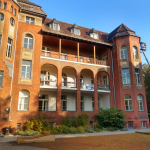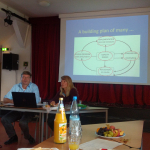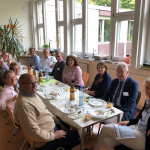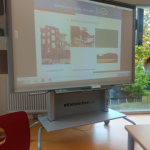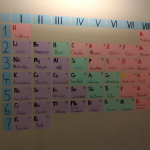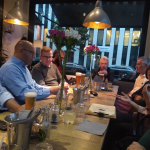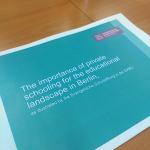Berlin 30 years after the Fall of the Wall – what an exciting time to visit Protestant schools in this area. Eight school leaders from the Netherlands, from Estonia, Romania and Poland took the chance and participated in the study tour offered by the CoGREE member organisations ICCS and IV. From 24 to 27 September 2019 visits of three different schools and meetings with administrative officers lay ahead of the group.
One of the schools was the “Evangelische Schule Pankow”. Headmaster Gunnar Hermann not only presented the school as such but also explained how they promote the school’s development. Thanks to a self-evaluation, teachers, students and parents develop regularly a new school programme together deciding on the main development goals of the school for the next couple of years.
The “Evangelische Schule Frohnau” and the “Evangelische Schule Neuruppin” on the other hand are characterized by the fact that they are both primary and secondary schools. So most of the students spend their entire school life there. At both schools, the very good relationships between students and teachers and the “family spirit” school culture impressed the visiting group. In Frohnau, headmaster Christine Behnken discussed with the group the challenges of having a rather homogenous student body. How to confront these students with life outside their “bubble”? Students from the 11th grade English class then showed the school leaders around and answered questions.
In Neuruppin, former student Albert who graduated this summer took over this task. In addition to that, the group had the chance to get a glimpse into a 1st grade lesson, to discuss with a teacher and to exchange with vice-headmaster Dr Bettina Labahn. What makes the school special is the focus on art, music and drama as well as their extensive project work especially with external partners from the city community. The goal: to give every student the chance to discover his or her special talent.
The school visits were rounded off by meetings with officials from the overarching church and school structures in Berlin and Brandenburg. Whereas Dr Friedhelm Kraft explained the system of Religious Education, Rainer Gronen from the regional school foundation explained the work of his umbrella organisation for the Protestant schools in Berlin and Brandenburg. He and his colleagues take care of administrative tasks, employ teachers, offer counselling, exchange and teacher training. Currently, a special focus is on the topics of digitalisation, diversity and educational quality.
Apart from that, the guided city tour through Jewish Berlin turned out to be an intriguing extra to the study tour programme. The tour guide impressed everyone with her deep knowledge about the Holocaust and the development of Jewish life in Berlin. Something especially positive: the Jewish community is growing again.
In the end, all participants were very grateful for these opportunities of exchange with locals from Berlin and Brandenburg but also within the group. Full of ideas for their respective schools, the participants went to catch trains and flights to return home.

